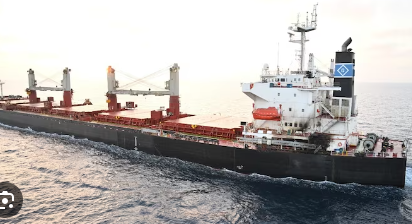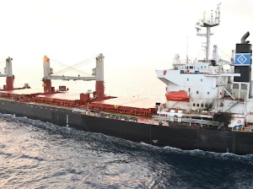
Indian Warship Responds to Distress Call from Cargo Vessel under Drone Attack
Manas Dasgupta
NEW DELHI, Jan 18: The Indian Navy’s destroyer INS Visakhapatnam swiftly responded to a distress call by Marshall Island-flagged merchant vessel m.v.Genco Picardy following a drone attack at 11.11 p.m. on January 17. No casualties have been reported and the vessel is heading to the next port of call.
“INS Visakhapatnam, undertaking anti-piracy patrol in Gulf of Aden, acknowledged the distress call and intercepted the vessel at 0030 hrs on 18 Jan 24 in order to provide assistance. MV Genco Picardy with 22 crew (09 Indian) reported nil casualties and fire under control,” Navy said in a statement.
The Navy said after intercepting the vessel, Explosive Ordnance Disposal (EOD) specialists from the warship boarded the vessel early on Thursday to inspect the damaged area and after a thorough inspection, they have “rendered the area safe for further transit.” The vessel is proceeding to the next port of call, the Navy added.
As per marine traffic portal vesselfinder.com, m.v.Genco Picardy, a bulk carrier, departed Port of Safaga in Egypt on January 11 and was scheduled to arrive at Thoothukudi in Tamil Nadu, India, on January 24. The Indian Navy currently has around 12 warships deployed in the Arabian Sea area for anti-piracy and maritime security duties.
This is the latest in a series of drone attacks or hijacking attempts of Indian-flagged or foreign-flagged vessels with Indian crew. Since the Israeli offensive in Gaza, there have been a series of attacks on merchant ships from Houthi rebels in Yemen in the Red Sea as well as the Arabian Sea, including few instances where Indian-crewed vessels headed to India were hit by drones, m.v. Chem Pluto and m.v. Sai Baba. The Navy Chief Admiral R Hari Kumar issued instructions to firmly deal with such maritime incidents.
Liberian-flagged vessel MV Chem Pluto, with 21 Indian crew members, was the target of a drone attack off India’s west coast on December 23. Besides MV Chem Pluto, another commercial oil tanker that was on the way to India came under a suspected drone strike in the Southern Red Sea on the same day. The vessel had a team of 25 Indian crew. In another incident, Malta-flagged vessel MV Ruen was hijacked on December 14 by pirates.
Attacks on the cargo vessels continued unabated even as the United States-led coalition intensified strikes on Houthi military targets in Yemen in a bid to “degrade” their capabilities in launching drone attacks on commercial shipping in the Red Sea and the Gulf of Aden.
The U.S. Central Command (CENTCOM) said on Thursday that on January 17 at approximately 11.59 p.m. (Sanaa time), it conducted strikes on 14 Iran-backed Houthi missiles that were loaded to be fired in Houthi-controlled areas in Yemen.
“These missiles on launch rails presented an imminent threat to merchant vessels and U.S. Navy ships in the region and could have been fired at any time, prompting U.S. forces to exercise their inherent right and obligation to defend themselves,” USCENTCOM said in a post on X. These strikes, along with other actions we have taken, will degrade the Houthi’s capabilities to continue their reckless attacks on international and commercial shipping in the Red Sea, the Bab-el-Mandeb Strait, and the Gulf of Aden, it stated.
In a related development, on Wednesday, U.S. National Security Adviser Jake Sullivan announced the designation of Ansarallah, also known as the Houthis, as a Specially Designated Global Terrorist.
Admiral R. Hari Kumar has pointed out that there were 35 drone attacks in the last 40 to 42 days on ships and the target was Israel-owned ships or those linked to Israel, and mainly in the Red Sea, the North Arabian Sea, and the Central Arabian Sea. He said the Navy had collected samples of debris from three vessels (which were attacked) and was examining them forensically to identify the origin of the attack.
In the first week of January, Indian Navy MARCOs (Marine Commandos) boarded a Liberian-flagged bulk carrier m.v. Lila Norfolk in the North Arabian Sea and rescued the crew, including 15 Indians and six Philippines, locked themselves in the citadel, after it was boarded by pirates, successfully foiling a hijacking attempt.
In December, Malta-flagged tanker m.v. Ruen, with 18 crew onboard, was hijacked by Somali pirates approximately 700 miles from the Indian coast and the vessel is currently off the coast of Somalia.
In response to these incidents, the Indian Navy has substantially enhanced maritime surveillance efforts in Central and North Arabian Sea and augmented force levels. Task groups comprising destroyers and frigates have been deployed to undertake maritime security operations and render assistance to merchant vessels in case of any incident and aerial surveillance by long-range maritime patrol aircraft and unmanned aerial vehicles has been enhanced to have a complete maritime domain awareness.
Admiral Hari Kumar said on Thursday that the Indian Navy was coordinating with navies of “partners” countries to ensure safe sea passage amid the “resurgence” of piracy attacks. He asserted that the Indian Navy won’t permit any piracy.
“We have seen that till about last year, piracy had become zero. We have seen a resurgence that is probably because of the disturbance due to drone attacks in the Red Sea. We have taken robust action and will not allow piracy to continue,” he said. We have deployed an adequate number of actions. We are not allowing any piracy will be taken.”
“We are working with our partners in the regions. There are many partners who want to ensure Indo-Pacific is free, open inclusive. To make it rule-based safe and secure we will collaborate with smaller countries in the region,” he added.
Meanwhile, the Biden administration re-designated the Yemen-based Houthi rebels as terrorist groups. The U.S. officials said the “Specially Designated Global Terrorist” (SDGT) designation, which hits the Iran-aligned group with harsh sanctions, was aimed at cutting off funding and weapons the Houthis have used to attack or hijack ships in vital Red Sea shipping lanes.
The Houthis’ campaign has disrupted global commerce, stoked fears of inflation and deepened concern that fallout from the Israel-Hamas war could destabilize the Middle East. The Houthi militia movement, which says the attacks on commercial ships were aimed at supporting the Palestinians in Israel’s war in Gaza, has threatened a “strong and effective response.”
“We will continue to counter and blunt Iranian malign influence wherever we can. So of course the choice to move away from Iran is now in the hands of the Houthis,” said a second official, adding that the U.S. would consider lifting the designation if the attacks on shipping cease.













